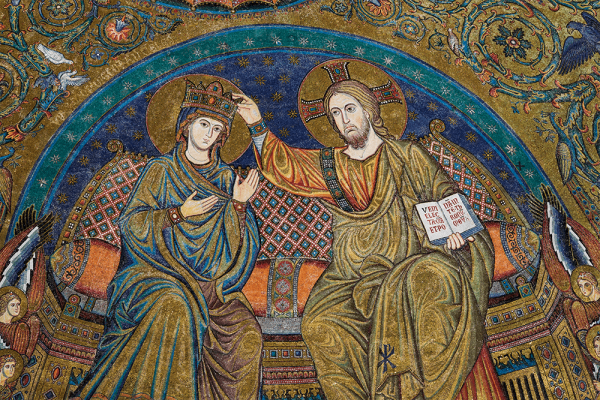I’ll never forget when I first met Mary, the mother of God. I was in Rome and it was a cool summer day — perfect for a long walk on cobblestone roads lined by cars and cafés.
With the morning free, I packed a small snack and looked for a place to read my textbook while sipping espresso. Sitting at a table with a cup in hand, I couldn’t slow my mind. I was there to learn about the faithfulness of the great Christians through centuries past, yet my thoughts were filled with uncertainty and doubt. I was halfway through my undergraduate studies, newly engaged, and just beginning to discern what my future might hold. I was anxious, tired, and filled with questions concerning God’s call on my life, God’s providence, and God’s action in the world. I was troubled by and unsure of my Christian faith; I was worried that by the time I stopped deconstructing, there would be little to nothing left of my faith.
Looking for a quiet place to rest my aching mind, I stumbled upon the beautiful Roman cathedral Santa Maria Maggiore — The Basilica of Saint Mary Major. Although the basilica was enormous, I found a seat that felt tucked away behind one of the towering marble columns. Above the apse, my eyes focused on a colorful mosaic of Jesus crowning Mary as she sits at his right hand. As the angels and disciples look upon her, Mary’s face doesn’t express excitement or worry, but rather she looks content and at peace as she willingly receives her royal crown. I remember sitting there not wishing for a crown, but just for Jesus to be near.
As an evangelical Protestant who grew up in a nondenominational megachurch, I didn’t know much about Mary. I was taught to be wary of those who spoke of Mary “too much.” Nonetheless, I opened the Bible in front of me to the one place I knew I could find her story: Luke 1.
“Greetings, favored one! The Lord is with you!” (v. 28) the angel declares. I had heard plenty of sermons on this verse and how we, like Mary, must say “Yes!” to God. Pious, trusting, and obedient — this is the Protestant Mary. “Here am I, the servant of the Lord; let it be with me according to your word” (v. 38).
Discouraged and frustrated, I was ready to close the text and move on with my day until my eyes caught a few words on the page: “But she was much perplexed by his words and pondered what sort of greeting this might be.” (v. 29).
Perplexed? Pondered? I found a new comfort in this passage as these words resonated with me in a way they never had before.
As I continued reading Luke’s account, I was reminded of a verse I remembered well, “Mary said to the angel, ‘How can this be, since I am a virgin?’” I had always read Mary’s reply as an obligatory question. But framed within the context of verse 29, I read this response in a new light: Mary was confused, perhaps even panicked, and she was also uncertain what this news would mean for her future.
Despite this uncertainty, Mary is called “favored” even before the text notes her “perplexion.” As Martin Luther wrote in his 1521 commentary on the Magnificat, “the fullness of Mary’s blessedness is … for this one thing alone, that God regarded her.” Therefore, Mary is not favored because of her perfection or unwavering faith, but Mary is favored because of the faithfulness of God. She is invited into God’s plan not because of her achievements, status, or goodness, but rather because God chose to lift up the lowly (Luke 1:52).
Mary comes from a tradition of faithful people in the Bible who honestly question God. Whether it is Moses initially refusing God’s call to free the Hebrews from slavery, the Psalmist’s lamentations, or Jeremiah likening God to a “deceitful brook,” Mary, too, has pointed questions for God.
God makes ample space for these questions and doubts in the kingdom.
In a cultural moment where religious deconstruction is being widely discussed, Mary offers us hope. I can only imagine over those nine months the questions, doubt, and frustration Mary felt toward the God who called her to be the mother of the savior of the world. And yet, we can have hope in this: that Mary was favored by God regardless of her doubt.
The same is true for us. The grace God extended to Mary is now extended to all of humanity even in the midst of our confusion and doubt.
Got something to say about what you're reading? We value your feedback!







